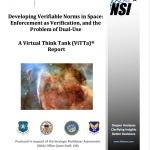Enforcement as Verification, and the Problem of Dual-Use

[Q21] What can the US do to best facilitate development of verifiable norms that maintain a peaceful space domain?
Author | Editor: Kuznar, L. & Stevenson, J. (NSI, Inc).
Summary Response
This report describes expert views on the existence and non-existence of space norms and the challenges and opportunities norms represent for peaceful space use. At the broadest level, norms are informal but generally accepted rules of behavior that are recognized and understood by a community,3 in this case a community of nations. Norms can emerge from either formal or informal channels, as Jonty Kasku-Jackson of the National Security Space Institute argues. Informal means of norm development include persuasion emerging from being a good exemplar of norm-based behavior, such as: the “creation of domestic legislation and regulations that serve as a model for others to adopt, publication and acceptance of academic papers, and shaping the discussion during ‘Track 2’ (non- governmental, informal, and unofficial) conferences and meetings” (Kasku-Jackson). Formal rule development examples consist of: “negotiation and implementation of binding international treaties, non-binding codes of conduct, United Nations General Assembly Resolutions, and state declaratory policy” (Kasku-Jackson).
The expert contributors generally agree on the need for norms from both informal and formal channels to maintain a peaceful space domain. The most verifiable norms, the contributors emphasize, would generally stem from more formal channels in so far as the US could facilitate norm development by leading in the responsible and transparently measurable use of space, and through the use of treaties.
Are Norms Necessary for a Peaceful Space Domain?
An increasingly large and diverse array of actors, both state and commercial, are actively seeking to exploit and explore the space domain, dramatically shifting the political context of space. The contributors indicate that states newly entering the space domain (India, North Korea, Germany, Australia), competing major powers (US, Russia, China), and commercial actors (SpaceX, Virgin Galactic, many new satellite companies) have different interests and perspectives on space. The diversity of the actors is likely to represent a range of potentially incompatible interests. According to the contributors, it appears that competing major powers are attempting to maintain their advantages within the space domain, new states are seeking affordable and perpetual access to the space domain, and commercial actors are seeking partners and initiatives that will expand the size and profitability of space markets and ventures.
Maintaining a peaceful space domain amidst the growing heterogeneity of interests in space, Dr. P.J. Blount of the University of Luxembourg notes, will require the United States to develop “norms for responsible space activities that help to ensure coordination among all space actors.”4 Norms can function to coordinate a range of interests because norms, as detailed by Kasku-Jackson, “outline good behavior and bad behavior for the [space] community.” By identifying problematic areas of space use through active engagement with diverse space actors, the United States can shape a consensus with wide-spread buy-in.
Dean Cheng of the Heritage Foundation concurs that norms are based on shared expectations and that a diverse array of actors in the space domain often lack these critical commonalities. Cheng questions, however, whether United States leadership and engagement with those interests will lead to stable norms that, whether verifiable or not, will help maintain a peaceful domain: Americans “talk about creating norms because we live in a rule of law society governing through mediation, and we believe that the law itself has value, separate from whoever comes before it,” but “what is the purpose of these norms and when are these norms supposed to operate?” For Cheng, norms advocates have not fully appreciated that developed and verifiable norms can also be used to entrench competing interests in ways that limit the United States’ options. In his words, the United States can “go ahead and create as many [restrictive] norms as possible,” our adversaries will sign on to these norms and hold us to them. They will make the United States “live by [its] rules,” although our adversaries may not abide by them, making these norms “self-straightjacketing.”
Achieving Verifiable Norms: Codification, Enforcement, and Measurement
There was disagreement among the contributors on whether norms require formalization (in treaties) to be effectively verifiable. Blount concedes that “norms need not come in the form of a binding treaty,” but rather could “come in a variety of mechanisms that solidify what constitutes responsible space activities.” Blount’s optimism that non-codified norms could still be verifiable and enforceable notwithstanding, most of the contributors feel that formal agreements are the best pathway to verifiable, enforceable norms.5 The mantra that verification is enforcement typifies the views the contributors.6 Some contributors focus on the potential usefulness of formal agreements versus norms. For instance, David Koplow of Georgetown University emphasizes the usefulness of formal agreements and proposes that they would provide a vehicle for regulating space use. According to Dr. Moriba Jah of the University of Texas at Austin, these norms should be “things that promote transparency and are things that are measurable, and not measurable just by one entity but measurable by the community at large.”
In fact, many of the contributors stress the need for metrics to verify space use, which, as Marc Berkowitz of Lockheed Martin indicates, would be difficult as it entails the measurement of behavior that may not be obvious, or have clear intent as in dual-use technologies. The contributors also lament that the US does not currently have adequate capabilities to verify actions in space and must invest resources to strengthen verification capabilities, particularly in space situational awareness (SSA) capabilities. As Kaksu-Jackson notes, “SSA is a foundationalcapability thatfacilitatesattribution of activities in space and therefore supports norm enforcement.”
Conclusion
After considering whether norms are necessary for a peaceful space domain, the expert contributors address how enforcement applications of norms could provide an avenue for verification. They generally agree that an increase of diverse actors (global powers, states recently entering the space domain, commercial actors) with diverse interests (domination, deterrence, profit) increases the difficulty in developing shared norms, since norms by definition imply shared values. Given the historic difficulty in achieving effective formal agreements, the contributors share a hope that less formal norms might be an option for regulating a responsible use of space. However, they often fell back upon discussion of the value of formal agreements, exhibiting a bias toward formal rules given their explicitness. Another issue the contributors stress is the need for measurable verification of how space is being used by actors, both to mark norm violations and to support guidelines set forth in formal agreements.
Contributors
Major General (USAF ret.) James Armor2 (Orbital ATK); Marc Berkowitz (Lockheed Martin); Dr. P.J. Blount (University of Luxembourg); Dean Cheng (Heritage Foundation); Faulconer Consulting Group; Joanne Gabrynowicz (University of Mississippi School of Law); Harris Corporation; Dr. Peter L. Hays (George Washington University); Theresa Hitchens (Center for International and Security Studies at Maryland); Dr. Moriba Jah (University of Texas at Austin); Christopher Johnson (Secure World Foundation); Jonty Kasku-Jackson (National Security Space Institute); David Koplow (Georgetown Law); Dr. George Nield (Federal Aviation Administration); Dr. Xavier Pasco (Fondation pour la Recherche Stratégique Paris, France); Dr. Luca Rossettini (D-Orbit, Italy); Matthew Schaefer and Jack M. Beard (University of Nebraska College of Law); Dr. Michael K. Simpson (Secure World Foundation); Michael Spies (United Nations Office of the High Representative for Disarmament Affairs); Dr. Mark Sundahl (Cleveland-Marshall College of Law); ViaSat, Inc.; Dr. Frans von der Dunk (University of Nebraska College of Law); Dr. Brian Weeden (Secure World Foundation)

Comments